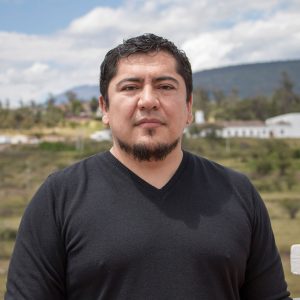Lenin Javier Ramirez Cando, Ph.D.
Professor Lenin holds a Bachelor of Science in Natural Resources Biotechnology Engineering (2012) from the Universidad Politécnica Salesiana. He furthered his education with a Master of Science in Toxicological Risk Assessment and Control of Environmental Contaminants (2015) from the University of Pavia, Italy. Subsequently, he earned a Doctor of Philosophy in Sustainable Management of Agricultural, Forestry, and Food Resources (2017) from the University of Florence, Italy. Currently, he serves as a Professor at Yachay Tech University in Urcuquí, Ecuador.
Experienced Environmental Consultant and Researcher with a strong academic background, adept at managing teams and administering budgets. Expertise encompasses inventory management, equipment operation, and meticulous documentation.
A highly qualified Research Coordinator with proven experience overseeing the successful implementation of research studies and managing all associated administrative functions. Possesses in-depth knowledge of agricultural sustainability and environmental engineering and is proficient in statistical software packages such as R and SPSS.
Offers six years of relevant experience and a strong desire to contribute to advancing research knowledge. Research profile includes: Life Cycle Assessment (LCA) of bioenergy crops, Risk assessment and management of environmental contaminants, experimental nanotoxicology, and successful project initiation and implementation at both academic and industrial levels.
Throughout her professional career, she has actively participated in research and development projects in the field of applied sciences to biological resources for both private companies and the public sector, with a focus on optimizing biotechnological processes to obtain high-value-added services and products.
Workshop
To register for this workshop, please click on its description.
The In silico design of multi-epitope vaccines Workshop will provide a comprehensive overview of computational approaches used in the design of multi-epitope vaccines. This workshop will be held on June 3, 2025, at the Computer Labs of the María Auxiliadora Campus, Salesian Polytechnic University, prior to the CITIS XI 2025 Congress.
Participants will learn about the latest advancements in using computational tools to identify and design immunogenic epitopes, predict vaccine efficacy, and evaluate potential adverse effects. This workshop is ideal for researchers, students, and industry professionals interested in vaccine development and computational biology.
Key topics to be covered include:
- Principles of epitope prediction
- Design of multi-epitope vaccines
- Computational tools for vaccine design
- Case studies and real-world applications
All workshops will be held on June 3rd, at the María Auxiliadora Campus of Politecnica Salesiana University, located at Km. 19.5, Vía a la Costa, Guayaquil – Ecuador.
Workshop # 1: In silico design of multi-epitope vaccines
Workshop Instructor: Lenin Javier Ramirez Cando, Ph.D.
Schedule: 09:30 to 13:30
Room: Computer Lab A1
Description: This workshop offers an in-depth introduction to computational strategies for vaccine development. Participants will explore key tools and methods for epitope prediction, multi-epitope vaccine design, and efficacy assessment. It is ideal for researchers, students, and professionals in computational biology and vaccine research.
Topics include:
- Epitope prediction principles
- Multi-epitope vaccine design
- Computational tools and platforms
- Case studies and applications
Workshop #2: Sizing of Off-Grid and Grid Connected Photovoltaic Systems
Workshop Instructor: Juan Carlos Lata, Ph.D.
Schedule: 14:00 to 18:00
Room: Computer Lab A2
Description: This workshop provides essential knowledge and skills for designing and analyzing photovoltaic systems in off-grid and grid-connected configurations. Through theoretical and practical sessions, participants will learn to calculate system capacity, select components, and assess technical and economic feasibility.
Topics include:
- Sizing of solar panels and system components
- Off-grid and grid-connected system design
- Selection of inverters, batteries, and protections
- Technical and economic project evaluation
Workshop #3: Decoding Images: Exploring classification techniques for bioimages and beyond
Workshop Instructor: Hernan Andres Morales, Ph.D.
Schedule: 09:30 to 13:30
Room: Computer Lab A7
Description: This workshop introduces supervised and unsupervised image classification using machine learning, focusing on deep learning. While centered on bioimages, it highlights the versatility of these methods across multiple fields through theory and hands-on practice.
Topics include:
- Supervised and unsupervised classification
- Deep learning for image analysis
- Applications beyond bioimage processing
- Practical exercises with real datasets
Workshop #4: Nanobodies as small wonders driving therapeutic environmental and research advances
Workshop Instructors: Serge Muyldermans, Ph.D. and Rosa Vega, M.Sc.
Schedule: 14:00 to 18:00
Room: Auditorium 1, 2nd Floor
Description: This workshop offers a theoretical overview of nanobodies, focusing on their structure, production, and wide-ranging applications in research, diagnostics, and therapy. Participants will explore experimental protocols and learn about current and emerging uses of these versatile biomolecules.
Topics include:
- Nanobody characteristics and applications
- Generation and engineering strategies
- Experimental protocols for production and selection
- Future perspectives in nanobody-based research
Workshop #5: Multidisciplinary Evaluation of Energy Consumption in Alternative Propulsion Systems with Energy Accumulators
Workshop Instructor: Jairo Darío Castillo, Ph.D.(c)
Schedule: 14:00 to 18:00
Room: Computer Lab A4
Description: This workshop explores the evaluation of energy consumption in alternative propulsion systems, focusing on the role of energy accumulators. Participants will gain insights into mechanical, electrical, and environmental aspects through a multidisciplinary approach that bridges engineering and sustainability.
Topics include:
- Types of alternative propulsion systems
- Role and selection of energy accumulators
- Energy efficiency analysis and modeling
- Environmental and performance assessment
Workshop #6: Leveraging AI-Powered Chatbots for Educational Innovation
Workshop Instructors: Julio Proaño Orellana, Ph.D. and Gustavo Navas Ruilova, Ph.D.
Schedule: 09:30 to 13:30
Room: Computer Lab A2
Description: This workshop introduces designing and implementing AI-driven chatbots to enhance learning experiences and support educational processes. Participants will explore how conversational AI can improve engagement, personalize learning, and streamline academic services across diverse educational contexts.
Topics include:
- Fundamentals of AI chatbots in education
- Design and deployment strategies
- Enhancing student engagement and support
- Case studies and practical applications
Workshop #7: Genomic sequencing and applied bioinformatics: from the laboratory to practical analysis
Workshop Instructor: Naomi Mora, M.Sc.
Schedule: 14:00 to 18:00
Room: Computer Lab A7
Description: This workshop offers a hands-on introduction to genomic sequencing and bioinformatics, combining theoretical foundations with practical analysis. Participants will explore tools and workflows to analyze genomic data and understand their applications in public Health and social innovation.
Topics include:
- Fundamentals of sequencing technologies (NGS, MinION, Illumina)
- Basic command-line and Galaxy platform usage
- Sequence alignment, phylogenetic analysis, and community profiling
- Applications in One Health and Public Policy
Workshop # 1: In silico design of multi-epitope vaccines
Workshop Instructor:
Lenin Javier Ramirez Cando, Ph.D.
Room:
Computer Lab A1
Schedule:
09:30 to 13:30
Description: This workshop offers an in-depth introduction to computational strategies for vaccine development. Participants will explore key tools and methods for epitope prediction, multi-epitope vaccine design, and efficacy assessment. It is ideal for researchers, students, and professionals in computational biology and vaccine research.
Topics include:
- Epitope prediction principles
- Multi-epitope vaccine design
- Computational tools and platforms
- Case studies and applications
Workshop #2: Sizing of Off-Grid and Grid Connected Photovoltaic Systems
Workshop Instructor:
Juan Carlos Lata, Ph.D.
Room:
Computer Lab A2
Schedule:
09:30 to 13:30
Description: This workshop provides essential knowledge and skills for designing and analyzing photovoltaic systems in off-grid and grid-connected configurations. Through theoretical and practical sessions, participants will learn to calculate system capacity, select components, and assess technical and economic feasibility.
Topics include:
- Sizing of solar panels and system components
- Off-grid and grid-connected system design
- Selection of inverters, batteries, and protections
- Technical and economic project evaluation
Workshop #3: Decoding Images: Exploring classification techniques for bioimages and beyond
Workshop Instructor:
Hernan Andres Morales, Ph.D.
Room:
Computer Lab A7
Schedule:
09:30 to 13:30
Description: This workshop introduces supervised and unsupervised image classification using machine learning, focusing on deep learning. While centered on bioimages, it highlights the versatility of these methods across multiple fields through theory and hands-on practice.
Topics include:
- Supervised and unsupervised classification
- Deep learning for image analysis
- Applications beyond bioimage processing
- Practical exercises with real datasets
Workshop #4: Nanobodies as small wonders driving therapeutic environmental and research advances
Workshop Instructor:
Serge Muyldermans, Ph.D. and Rosa Vega, M.Sc.
Room:
Auditorium 1, 2nd Floor
Schedule:
14:00 to 18:00
Description: This workshop offers a theoretical overview of nanobodies, focusing on their structure, production, and wide-ranging applications in research, diagnostics, and therapy. Participants will explore experimental protocols and learn about current and emerging uses of these versatile biomolecules.
Topics include:
- Nanobody characteristics and applications
- Generation and engineering strategies
- Experimental protocols for production and selection
- Future perspectives in nanobody-based research
Workshop #5: Multidisciplinary Evaluation of Energy Consumption in Alternative Propulsion Systems with Energy Accumulators
Workshop Instructor:
Jairo Darío Castillo, Ph.D.(c)
Room:
Computer Lab A8
Schedule:
14:00 to 18:00
Description: This workshop explores the evaluation of energy consumption in alternative propulsion systems, focusing on the role of energy accumulators. Participants will gain insights into mechanical, electrical, and environmental aspects through a multidisciplinary approach that bridges engineering and sustainability.
Topics include:
- Types of alternative propulsion systems
- Role and selection of energy accumulators
- Energy efficiency analysis and modeling
- Environmental and performance assessment
Workshop #6: Leveraging AI-Powered Chatbots for Educational Innovation
Workshop Instructor:
Julio Proaño Orellana, Ph.D. and Gustavo Navas Ruilova, Ph.D.
Room:
Computer Lab A2
Schedule:
09:30 to 13:30
Description: This workshop introduces designing and implementing AI-driven chatbots to enhance learning experiences and support educational processes. Participants will explore how conversational AI can improve engagement, personalize learning, and streamline academic services across diverse educational contexts.
Topics include:
- Fundamentals of AI chatbots in education
- Design and deployment strategies
- Enhancing student engagement and support
- Case studies and practical applications
Workshop #7: Genomic sequencing and applied bioinformatics: from the laboratory to practical analysis
Workshop Instructor:
Naomi Mora, M.Sc.
Room:
Computer Lab A7
Schedule:
14:00 to 18:00
Description: This workshop offers a hands-on introduction to genomic sequencing and bioinformatics, combining theoretical foundations with practical analysis. Participants will explore tools and workflows to analyze genomic data and understand their applications in public Health and social innovation.
Topics include:
- Fundamentals of sequencing technologies (NGS, MinION, Illumina)
- Basic command-line and Galaxy platform usage
- Sequence alignment, phylogenetic analysis, and community profiling
- Applications in One Health and Public Policy

